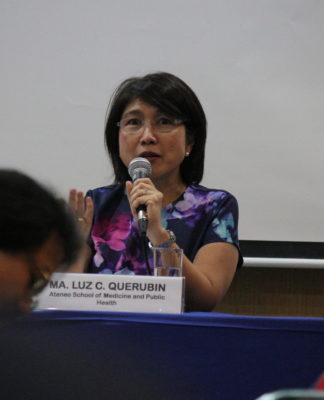 IS IT the task of the clergy to orient lay people toward government leadership?
IS IT the task of the clergy to orient lay people toward government leadership?
According to Pampanga’s priest-governor, Eddie Panlilio, it is the clergy’s responsibility to heed this “calling.”
“We have family life ministries and youth programs, but endeavors leading to the conscious formation of potential lay public administrators seem to be non-existent,” said Panlilio, who spoke to seminarians of the UST Central Seminary during the Fourth Padre Burgos Memorial Lecture Series last Sept. 18 at the Thomas Aquinas Research Complex.
“We have to admit that the clergy failed miserably in advocating these types of programs,” Panlilio said.
The governor said that the small participation of lay candidates in the last elections should be a “slap in the face of the clergy,” and not his decision to run for public office, as his detractors had claimed.
“We should have a better program when it comes to training our people, especially the laity, for good governance,” Panlilio said, mentioning the courses offered by the Ateneo School of Government as a good start. “We have the curriculum, we have the program. It’s now only a matter of availing and even enticing and encouraging our parish leaders to be imbued with Gospel values in the context of good governance.”
Recognizing this dilemma, Panlilio cooperated with the Archdiocese of San Fernando, Pampanga to relaunch the Parish Pastoral Council for Responsible Voting, a program of the Church active only during the election period, as the new Parish Pastoral Council for Responsible Politics, which involves consultative meetings with the elders and the youth from different barangays regarding the choice of qualities a political leader should possess.
‘Third choice’
During the lecture, “Politics as Christian Praxis: Toward a Philippine Politics Imbued with Gospel Values,” Panlilo narrated how he became an alternative candidate during the last elections.
“We were offering the people a third choice. Our motive was not simply to win; it was to make a statement to the nation and to the world that out of a million or so Kapampangans, there is a better alternative,” Panlilio said.
He hailed volunteerism as the driving force of the campaign, proudly telling the seminarians that he never had to spend a single centavo during his campaign, as donations flourished.
“At the outset, I myself did not project a win, but when support started coming, there was a growing sense of expectation among all of us,” Panlilio said. “We did not have any finances to match up the campaign machineries of my competitors during the first few days. But after people of goodwill coming from Pampanga, Manila and even abroad pitched in their support, our morale was boosted.”
Panlilio said his enemies launched black propaganda against him, but he countered this with Christian truth.
“As these arguments of lies and evil came down upon us, our volunteers started reflecting on the need for conversion and redemption by launching a conscientization campaign,” he said.
Last June 2, he victoriously took oath as Pampanga governor. Being a neophyte in the political arena, Panlilio’s first two months in office came as a culture shock.
“How often have we heard the phrase, “hindi ganoon sa gobyerno.” But I’m happy to tell you that the transition with the rank and file had not been that difficult after all,” Panlilio said. “All it took was a clear and unwavering declaration that all wrongdoing will not be tolerated. We also declared that honesty would be the order of everyday of service.”
He also initiatied leadership by example through practicing thrift, punctuality, and diligence in work. “We do not have a bundy-clock in the capitol, but true enough, we find our workers coming on time, and leaving after five, almost every day.”
“What is most difficult probably right now is the establishment of peace and harmony,” he said. “Sometimes it feels like we’re a lone voice crying in the wilderness. The old politics of patronage and dependency still rears its helm and many are saying that it is thus, and it will never change.”
Change “from within the system”
Panlilio lamented about the “moral decaying process” not only in Pampanga but throughout the Philippines as well.
“We build beautiful churches, recite beautiful and touching homilies, and give an atmosphere of liturgical soundness. The youth come to hear us, but after Mass, what do they see? They witness corruption and ineptitude. We are losing by default,” Panlilio said.
“The Church is not lax in terms of providing the moral principles and guidelines to different issues in the society. The CBCP has made pastoral statements against corruption, environmental degradation, prostitution, and other moral issues. We have been very good in providing guidelines,” he said. “But we lack advocacy. By advocacy we mean not only articulation of core principles and defining moral guidelines, but living them out and implementing them. Something has to be done from the inside. Meaningful changes can only come from within.”
Panlilio said his stint as governor of Pampanga was his way of doing things from the inside, infecting change in the system rather than dictating what the system should do.
“I believe this is the mystery of the Incarnation. When Christ converted humanity, he did not do it operating from outside and as a god. He went in and became human,” he said. “I believe my entry in politics is somehow similar to this, from articulation to advocacy.”















